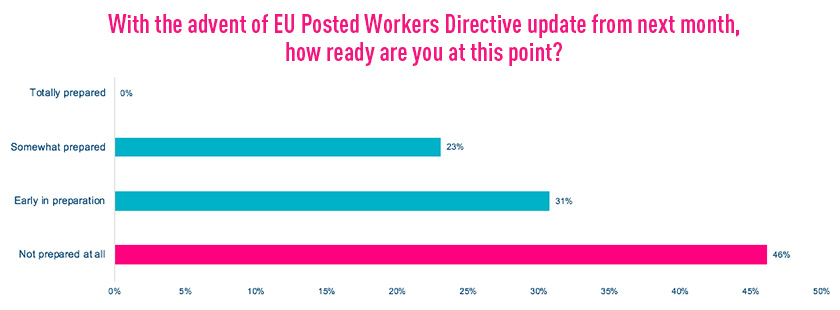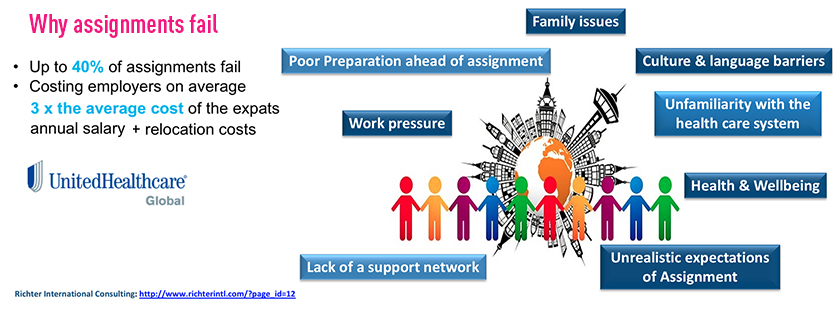
Facilitating Connections and Conversations at insideMOBILITY Digital (2 of 3)
Getting Leadership’s buy-in with better analytics
Kicking off day two of insideMOBILITY Digital, Graebel’s Alben Ngo and Lucy Penney delivered an interactive session on the importance of analytics to getting leadership onboard with mobility. By way of introduction, attendees were reminded how analytics drives better decisions and increases visibility, helping to demonstrate operational effectiveness, cost savings, and policy development. Above all, it helps to build a compelling business case, enhancing partnership opportunities with leaders. This was confirmed in a live poll, which revealed that 45% of attendees regarded stakeholder consultation as the primary purpose of analytics.
To illustrate the strategic value of data, Lucy Penney recalled a client who wanted to achieve a 25% cost reduction within their mobility programme. By identifying assignee underperformance, the team were able to advocate early repatriations to meet the reduction target. A good example, said Penney, of telling a story and driving impacts through data. Picking up this thought, Alben Ngo discussed the importance of segmenting data to suit your audience. By focusing on metrics categories – cost, volume, quality, talent, and operations – mobility teams can leverage the numbers most likely to resonate with specific leadership figures.
Attendees then shared their experiences of the type of metrics that help to gain traction. Cost data, said one, is key to getting a seat at the table and a useful tool for negotiation. Predictive trends data, said another, helps to focus leadership on the year ahead. One participant observed that data on gender and diversity is useful for engaging talent management and acquisition, illustrating where policies need to be adjusted to address assignee and workforce imbalance. Meanwhile, post-assignment retention rates help to highlight the need for clear repatriation paths and succession plans, which in turn benefit individual assignees and the business as a whole.
At the end of the session, Ngo noted that many corporations are currently requesting help in understanding the impact of COVID-19 on their mobility programmes – from an exception, cost and experience perspective. They are then using this data for future contingency planning.
With an update to the EU Directive on Posted Workers coming into effect in July, the second session of day two focused on readiness and engagement among attendee organisations. To introduce the topic, Graebel’s Beverly King described the complexities around navigating the rules in different EU countries. “Understanding your company’s appetite for risk, and how you’ll manage that from an administrative point of view,” said King, are key considerations.
While the implementation of the new rules has not been impacted by COVID-19, companies’ preparedness certainly has. By way of confirmation, a live poll revealed that 46% of attendees felt they still were ‘not prepared at all’ with less than one month to go.
As the session divided into breakout rooms, attendees discussed the delays and disruption caused by the global pandemic. One claimed that COVID-19 had distracted everybody from the Directive, with cost containment taking precedence over other internal projects. Another said that assignment bottlenecks were causing major problems and resource strain.
One participant said there was no clarity within their organisation as to who should take responsibility for compliance with the Directive, and this was even more ambiguous in non-EU headquartered companies. A lack of tools to track business travellers is also making it difficult to report on cross-border movement. Indeed, a second poll found that for 60% of attendees, tracking was the most time-consuming activity linked to the new rules.
One proposed solution was to use expense systems retrospectively to track business travellers’ movements. Another suggestion was to involve a range of teams, including legal, rewards, tax and mobility, to gain multiple perspectives and oversight. Only through internal collaboration, it seems, will companies tackle the complexities ahead.
Supporting expatriate mental health challenges
Day three of insideMOBILITY Digital began with a presentation and discussion on expatriate mental health. Introducing John Kaye and Dr Shoba Subramanian from UnitedHealthcare Global, Beverly King highlighted the importance of safeguarding the mental health of assignees, for whom relocation can be a challenging experience.
Dr Subramanian set the scene, describing how one in four people in the world will be affected by mental or neurological disorders at some point in their lives. And with the advent of the current global health pandemic, this trend is set to rise even further. Explaining that context is a key determinant of mental wellbeing, Dr Subramaniam pointed out expats are at double the risk of mental health conditions compared to those who never live abroad.
John Kaye then outlined the unique circumstances that can put pressure on global assignees. These include:
- Culture & language barriers
- Poor preparation pre-assignment
- Family issues
- Lack of support
- Unrealistic expectations
As a result of such pressures, “up to 40% of overseas assignments fail,” said Kaye, with mental health issues a key contributing factor. It’s therefore essential to support mental health on assignment, with employers needing to adopt a proactive approach. As Kaye remarked, “preparation is a continuity thread running through all companies that demonstrate best practice” in this area. Key preventative actions include:
- Pre-assignment risk assessments and health checks
- Cultural awareness training
- Language lessons
- Buddy systems
Employees can also discharge their duty of care through EAPs, robust insurance schemes, and wellbeing programmes, helping to protect against the significant personal and business costs of mental ill-health.
Mobility programmes reimagined
Day three concluded with a dynamic sharing of new and innovative approaches to relocation policies. As facilitator Katrin Razzano explained, policy trends, changes and creative solutions continue to evolve to meet the needs of clients, employees, transferees and managers.
But why is change happening? Internal drivers include:
- New markets and M&As
- New leadership, new focus
- Change in talent acquisition and talent management strategies
- Diversity and inclusion
Externally, change is also being driven by:
- Crises, in particular COVID-19
- Increased awareness of sustainability
- Five generations in the workforce, creating different needs and expectations of mobility
- An escalating war on talent
Splitting into breakout rooms, attendees discussed how mobility programmes are adapting to these changes. A common theme was a shift towards cost savings and localisation as a result of COVID-19, although participants agreed that unionisation made the process of policy change complex. Some spoke of enhancing existing policies, while others said they were adopting new models, such as coreflex and virtual assignments.
Indeed, virtual assignments emerged as a key topic, with companies looking to increase flexibility and minimise travel in response to the global pandemic. With more people than ever now working from home, virtual assignments have become a business necessity, although one that raises questions around cross-border tax liabilities, transfer pricing and immigration. While these complexities will take time to resolve, the principles and imperatives behind the virtual assignment could begin to reshape the global mobility landscape.
To further dive into the complex issues of virtual assignments, we are planning a live Q&A session – dates to be announced soon. If you aren’t yet part of the insideMOBILITY Slack group, please request to join here so you won’t miss out.
The conversation continues
Before, during and after insideMOBILITY Digital, delegates were encouraged to meet, share and connect via Graebel’s dedicated online Slack forum. Bringing like-minded people together, this forum continues to host engaging conversation and views on the topics covered during the week-long event and beyond. Submit your request to join here.

